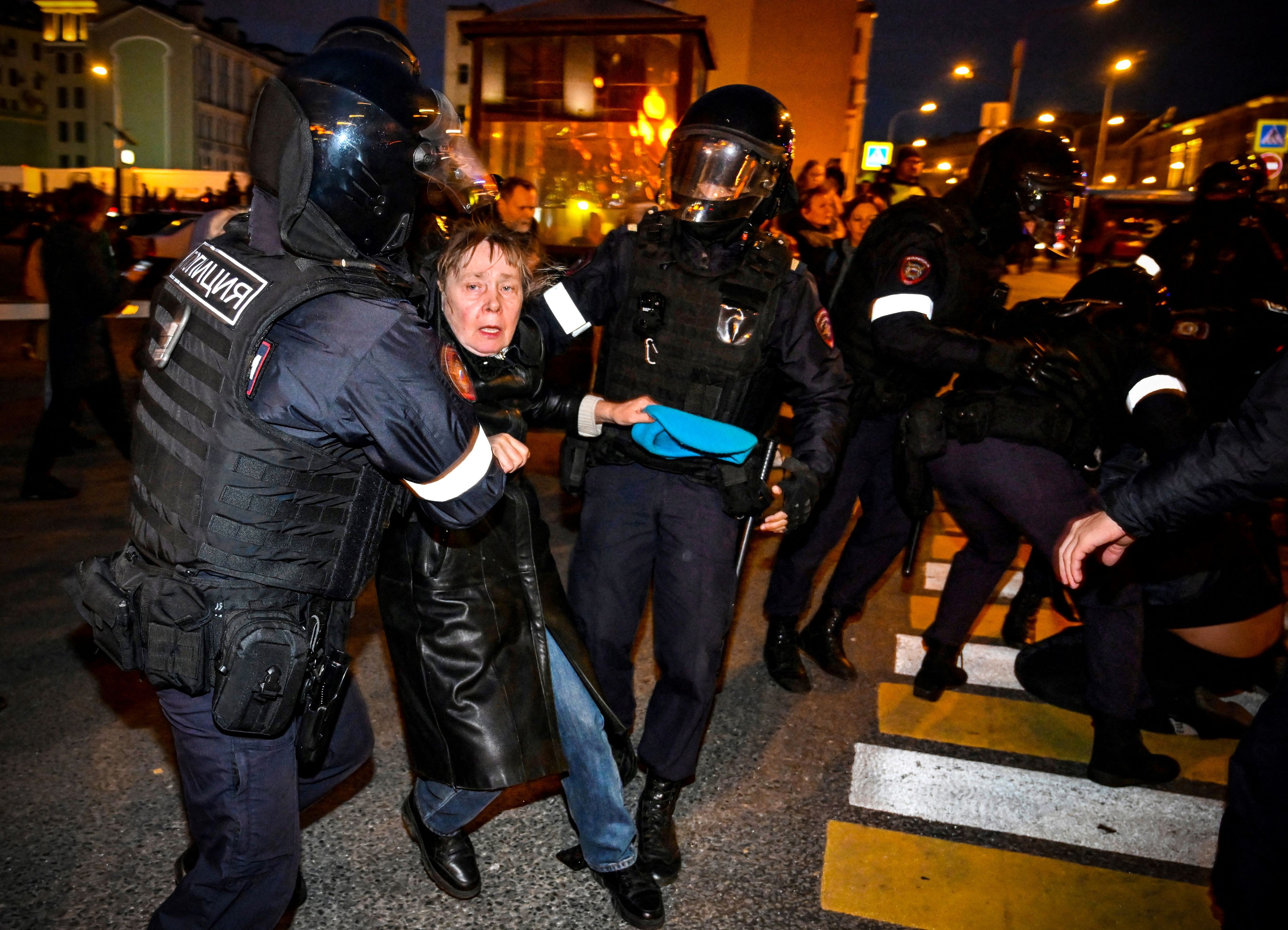Russian President Vladimir Putin is placing two of his biggest-ever political and strategic bets in a single week.
Why it matters: With his troops getting routed in northeastern Ukraine and their footholds elsewhere slipping, Putin eschewed strategic retreat in favor of high-risk escalation. He's mobilizing an estimated 300,000 citizens and preparing to declare 15% of Ukraine as Russian soil — backed by a blatant nuclear threat.
Driving the news: Putin's mobilization announcement was followed by scenes of protests in dozens of cities, military-age men crowding into airports and border checkpoints to flee conscription, and long lines of soon-to-be soldiers being herded onto buses and planes — particularly in provinces far from Moscow.
- Putin and Defense Minister Sergei Shoigu claimed that only about 1% of Russia's available reserves — roughly 300,000 military veterans with relevant expertise or combat experience — would be called up.
- But as Sergey Radchenko of Johns Hopkins notes, Putin's actual decree is vague enough that "just about anyone" could be enlisted, and the total number might be well beyond 300,000. Soldiers on short-term contracts will also be forced to remain on active duty.
- There have been numerous anecdotal reports of men being conscripted regardless of their military experience and age. Those who resist face jail time and some anti-mobilization protesters have been immediately conscripted, according to the monitoring group OVID-Info.
The big picture: The specter of conscription could potentially bring the war home to millions of Russians in a way nothing else has.
- Support for the war has remained static since it began, with roughly 45% of Russians solidly behind it, another 30% backing the war "with some reservations," and only a tiny fraction willing to pay the high price of protesting says Denis Volkov, director of the Levada Center, Russia's top independent pollster.
- Lately, more Russians say they have been tuning out the news, which Volkov attributes to fatigue or "psychological protection." Economic sentiment was improving, and many Russians wanted to move on.
- Now, says Tatiana Stanovaya of consultancy R. Politik, Russians are frantically searching the internet for news about mobilization and "getting much more than just information on who will be drafted."

Military analysts have also cast doubts on the Russian military's ability to integrate, train, and equip hundreds of thousands of soldiers, many of whom likely have no desire to fight this war.
- “One thing we’ve seen from the Russian military throughout this war: it hasn’t done most things well," says Rob Lee, a fellow at the Foreign Policy Research Institute and an expert on Russia's military. "So is mobilization going to be done that well? Are these units going to be well-trained and equipped when they deploy? Probably not.”
- “Russia can try to address the quantity aspect of the force but they can’t fix the quality," adds Michael Kofman, an analyst of Russia's military at CNA, noting, in particular, the dearth of experienced officers and advanced equipment.
- Kofman believes the mobilization order is unlikely to change the trajectory of the war, which currently favors Ukraine, but thinks it could allow Russia to sustain the fight for longer.
So-called "referenda" in four regions of Ukraine under total (Luhansk), near-total (Kherson), or partial (Donestk, Zaporizhzhia) Russian control are slated to run from Friday to Tuesday.
- The White House expects declarations that huge majorities wish to join Russia, potentially followed by an announcement from Putin granting that "wish."
- Needless the say, those moves would lack international support or legitimacy.
- Furthermore, Ukraine is conducting a major counteroffensive in Kherson and a surprise push in Kharkiv which is threatening Russia's positions in the Donbas. Thus, Putin would effectively be announcing that the very ground he's in danger of losing is, in fact, Russia.
Breaking it down: Analysts believe this is part of an effort to recast the war as defensive in nature — a fight to free people and lands that are truly Russian — and to lock-in Russia's gains.
- Putin warned Wednesday that Russia would use "all means at our disposal" to protect its territory, and could now bring the four Ukrainian regions under Russia's nuclear umbrella.
- The decision seems "almost like some kind of superstitious attempt to break free from a curse," because of the deeply held belief that Russia will always be victorious on its own soil, writes Alexander Baunov of the Carnegie Endowment.
- The message to the West, according to Stanovaya, is "either Ukraine retreats, or nuclear war."
The other side: Ukrainian and Western officials have been quick to insist that they won't let nuclear threats weaken their resolve. But some have also cautioned that Putin's warnings can't be dismissed.
- "We think it's just bluster," but that could change if Putin feels "backed into a corner," a senior European official told Axios on the sidelines of the UN General Assembly.
- The problem is that if Putin does come to feel that way, we might not know it, the official said.
The bottom line: "He’s now staking his regime on this war," Kofman says.







